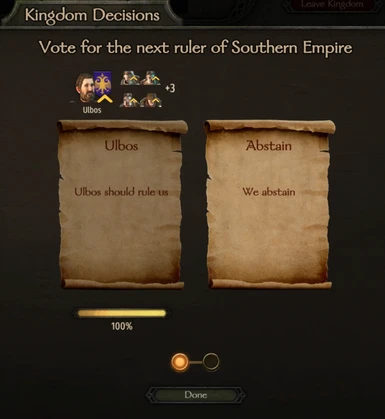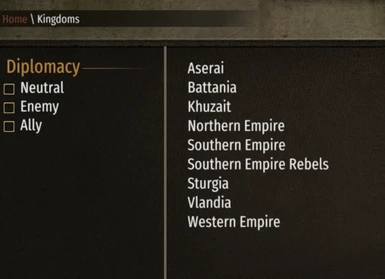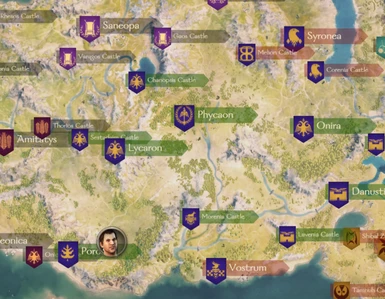About this mod
Tired of all Calradian kingdoms following the same bog-standard succession rules? This mod allows you to pick between several flavourful succession types for the default kingdoms. Options include "hereditary", keeping the kingdom in the same ruling clan, and various elective styles that take different indicators into account.
Working in 1.7.0-
- Permissions and credits
- Changelogs
- Donations
~~~~
Calradian succession should, like the cultures who inhabit the continent, be widely varied. Unfortunately, in the base game, all kingdoms follow the same succession rules, with the same weighting score for nominations and decisions.
This mod changes that completely. Currently there are 7 new, flavourful succession rules to assign from (through succession_defines.xml) that can completely change the topography of Calradian politics. They are:
- Hereditary [by default Vlandia]: Only the current ruling clan is eligible for the kingdom election. If, however, the ruling clan has been eliminated, this reverts into Military-based succession to handle the crisis.
- Inheritance [by default Southern Empire]: Similar to Hereditary, except the ruling clan's new leader is preferentially the adult child of the previous ruler. Adult children who are still members of the currently-ruling clan are preferred, although non-member heirs are allowed, and the ruling clan switches accordingly (eg. you marry Ira, Rhagaea bites it, your clan is now in charge!). Heirs outside of the kingdom (or in mercenary clans) still won't qualify, however.
- Military [by default Western Empire and Khuzait]: Nomination strength is calculated with the total number of commanded soldiers, multiplied by party morale. All vassals are eligible, since anybody can potentially be a strongman/woman.
- Oligarchical [by default Aserai]: Nomination strength is based on total clan gold, and non-village prosperity, to reflect the support of the mercantile class. Any vassal that owns at least one town is eligible.
- Landowning Elective [by default Sturgia]: Nomination strength is based on owned settlement notable relation multiplied by their power, to reflect how influential land-owners might be voting. Any vassal clan that owns a fief is eligible.
- Senate Elective [by default Northern Empire]: Nominations are effectively a popularily contest - the sum of your clan relations with other clans that have less influence than you. All vassals are eligible, but hopefully it doesn't bring back any homecoming king/queen nightmares.
- Plebian Elective [by default Battania]: The most complicated, but interesting method. Nomination strength is roughly proportional to how "popular" the nominee is with the populace. Strength is counted as "votes". For towns, (loyalty/100) * prosperity = "votes" for the owner clan. For villages, the "votes" are the hearths split between the notables, and the owner is awarded the votes from notables they have positive relations with. The remaining votes are split between all other clans evenly. Every vassal clan is eligible, but you'll find yourself at a severe disadvantage if you don't own any fiefs.
~~~
Term Limits have been implemented (as of 2.0.0)! This means not every clan rules for life, and a new election will be triggered on the weekly tick after their term has ended. The "term" attribute can be added to any succession tag, however meaningless it may be (eg. term limits on hereditary succession will simply elect the single available clan again).
~~~
Rebellion Discontent thresholds (added in 3.0.0!) are a measure of stability on succession. It's the sum of (only) the negative relations between the new ruling clan and the non-ruling clans. The rebel "leader" is selected as the most powerful of the discontented clans. Rebel clans are then selected based on whether they hate their kingdom's current rulership more than the potential rebel leader. Finally, the relations between the rebel clans are added or subtracted inversely from the total discontent, which is then compared to the threshold defined below.
How it's meant to boil down to is how much the vassal clans dislike the election outcome, weighed against how much they dislike each other! I aim for elective systems to be more stable than hereditary-based systems, especially if there are term limits - an annoyed vassal might be fine with waiting for a term to be up, but probably won't see any other recourse if the same clan will remainder in power indefinitely.
If the player is a vassal of the kingdom currently undergoing a less-than-smooth succession, they will be asked to pick a side - either staying loyal to the new ruler or joining the rebels. They gain a rep bump with the set of clans that they join with.
~~~~
These succession types can be implemented for specific cultures, both as a backup, and to handle newly-created kingdoms - both rebellions and player factions. Kingdom-specific succession types are checked first, with culture-specific only being looked at if the kingdom's doesn't exist.
If a kingdom and culture doesn't exist in the succession_defines.xml file, the system will revert to the vanilla mechanics, meaning any custom kingdoms are safe to include. If you want to apply one of the new succession types to a custom kingdom or culture, simply add a new XML tag with the appropriate StringID (which can be found in the custom kingdom mod's ModuleData folder). If the custom kingdom has a vanilla culture, you can either stay with their default, or add their kingdom-specific setup.
More succession types will probably come, but feel free to suggest others! Additionally, I'll be working on succession-motivated events (eg. rebellions and other crises).
~~~~~~~~~~~~~~~~
Check out my other mods HERE, including:
If you enjoy the mods, please endorse!











